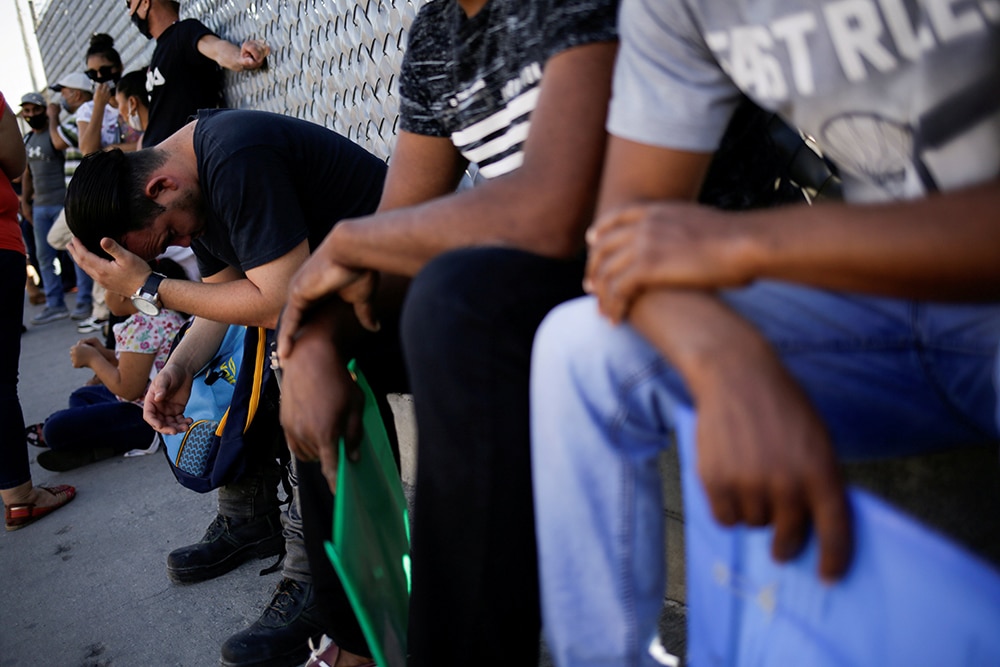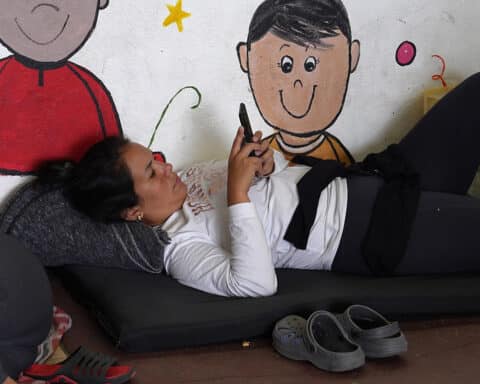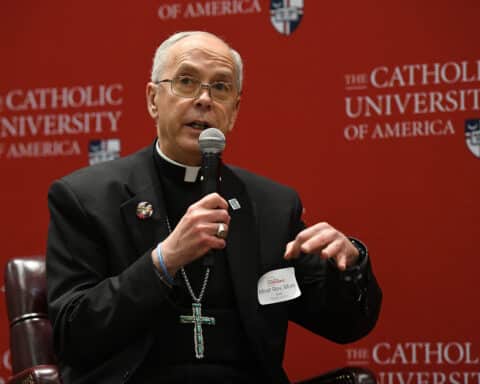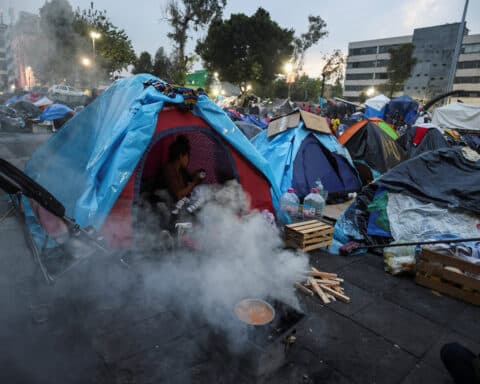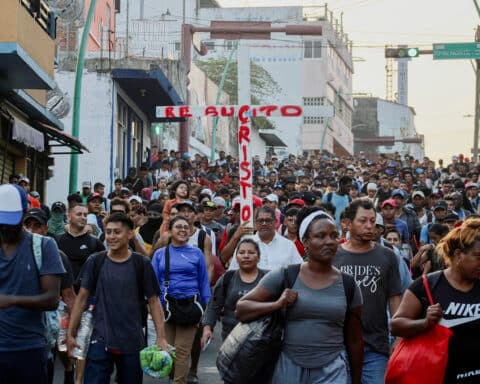Within hours of being sworn-in Wednesday, President Joe Biden was poised to send Congress an ambitious immigration bill that would begin to undo many of his predecessor’s policies while creating a pathway to citizenship for the estimated 12 million migrants living in the United States without legal documents.
Catholic immigration advocates acknowledge that some of the measures they would like to see could take months, if not years, to enact, since reversing many of former President Donald Trump’s immigration policies will require going through the federal government’s bureaucratic rule-making process.
“The immigration system is not going to snap back overnight, though there are some things that can be done right away,” said Ashley Feasley, the director of migration policy and public affairs for the U.S. Conference of Catholic Bishops.
On his first day in office, Biden signed executive orders that terminated Trump’s travel ban from several Muslim-majority countries and to safeguard the Deferred Action for Childhood Arrivals program. Biden also signed a proclamation to end the national emergency declaration that Trump declared in 2019 to divert federal funds for his border wall.
“I think with the Biden people dropping (the border wall), you’re not going to see a continuation of funds going to that effort,” Feasley said. “I’m hopeful, then, that there will be more opportunity to navigate that funding for other things that are needed, like alternatives to detention and some of the human trafficking offices that the Department of Homeland Security operates.”
Biden’s immigration plan, according to published reports, would create an eight-year pathway to citizenship for undocumented migrants and appropriate $4 billion in aid to tackle the underlying reasons for Central American migration, such as gang violence and political corruption. The plan also calls for ending country visa quotas, easing asylum limits, adding more technology to enhance security at the U.S.’ southern border, and allocating more resources for immigration courts.
The bishops’ conference, Feasley said, will also push the Biden administration on measures such as increasing the annual cap on accepting refugees for resettlement in the United States, overhauling the government’s system of adjudicating asylum claims, extending legal status for immigrants who arrived here from designated countries and reuniting thousands of migrant children who were separated from their parents as a result of the Trump administration’s “zero tolerance” border enforcement policy.
“In the modern era, we’re at one of the lowest points of legal immigration,” Feasley said.
The nonpartisan Migration Policy Institute, a Washington D.C. think tank, estimates that the Trump administration implemented more than 400 executive actions related to immigration. Those actions ran the gamut from Trump’s attempt to terminate the Deferred Action for Childhood Arrivals program to deploying active-duty military troops to the border.
“Some of them are regulations. Some of them are processing decisions. Some of them are administrative policies. But the long and short of it is that the intention was to decrease, through administrative means, legal immigration and a pathway to permanent residence and citizenship, in the particular disfavor of low-income, working-class people,” said Donald Kerwin, the executive director of the Center for Migration Studies, a Catholic think tank founded by the Congregation of the Missionaries of St. Charles Borromeo.
Kerwin told Our Sunday Visitor that the new administration’s policymakers will need to go through the formal public comment and rule-making procedures in order to undo some Trump-era immigration regulations.
“It depends on what the action is. If it’s just a policy memorandum or an operational decision, those can be rescinded. New memoranda can be put out,” Kerwin said. “If it’s a legal process like a regulation, then they’re going to have to go through the whole notice and comment process. That’s going to be time-consuming.”
The Center for Migration Studies has issued a 28-page report that outlines 40 administrative actions on immigration that it says the Biden administration can take in its first year. Those proposed actions include revoking the so-called Migrant Protection Protocols, which requires migrants seeking asylum in the United States to remain in Mexico while their cases are pending.
“There are tens of thousands of people in Mexico and elsewhere waiting for an (asylum) hearing,” Kerwin said. “Biden can revoke the Migrant Protection Protocols, but that doesn’t mean, operationally, that it would make sense to allow 5,000 people to come in in a particular week or something like that. They’re going to have to do that in an orderly, safe, managed way.”
The Catholic Legal Immigration Network Inc. (CLINIC), which provides legal services for migrants in the United States, released a detailed series of policy papers on immigration for Biden’s transition team.
“One thing we’re working to make clear to the incoming administration is that immigration needs to be a priority, period,” said Lisa Parisio, a CLINIC advocacy attorney for policy and outreach.
“Putting together and looking at a full extensive list of policy changes is absolutely crucial,” Parisio told Our Sunday Visitor. “At the same time, there’s also work that needs to be done to the infrastructure of the agencies immediately to begin to restore and build a new immigration system.”
Reforming the nation’s immigration system will require a lot more work than writing new regulations or issuing executive orders, officials said. Networks of partner agencies that worked to resettle refugees, provide legal and social services and housing to migrants will need to be rebuilt.
“One of the things that’s been extremely devastating but has kind of flown under the radar these past four years is the gutting of stakeholder engagement, of public outreach and education across all aspects of the immigration system. That needs to be restored,” Parisio said.
Advocates told Our Sunday Visitor that the nation’s legal immigration system has been cut in recent years so that not only fewer people received work visas but that legal permanent residents experienced delays in applying for naturalization.
“The lengths and processing times for family-based immigration visas is astronomical at this point,” Kerwin said.
Family-based immigration decreased, while the Trump administration’s “public charge rule” made it more difficult for immigrants to obtain legal status if they used public assistance. The previous administration also rewrote the mission statement of the U.S. Citizenship and Immigration Services, deleting the description of the United States as a “nation of immigrants.”
“How can all that be fixed? Some administrative things can be done as far as the processing of these applications, but that’s just no replacement for legislative reform,” Feasley said.
Noting the polarization in Washington, D.C., Kerwin said it will not be easy for Congress to pass comprehensive immigration reform, which the nation’s bishops have said should include a pathway to citizenship for the estimated 12 million immigrants who are living in the United States without legal status.
“It’s not going to be like turning a light switch back on here and everything changes,” Kerwin said.
In the meantime, Parisio said CLINIC will be calling on the Biden administration to extend the legal status of immigrants from designated countries such as Liberia and South Sudan, and to return to a more targeted immigration enforcement approach by prioritizing the arrest and prosecution of migrants charged with violent crimes. She said CLINIC also supports the creation of a federal taskforce to reunite separated migrant children with their families.
“That’s going to be crucial work,” Parisio said. “From what I’ve seen, the Biden administration seems to be indicating that they will be prioritizing that work, and it is crucial.”
Brian Fraga is a contributing editor for Our Sunday Visitor.

